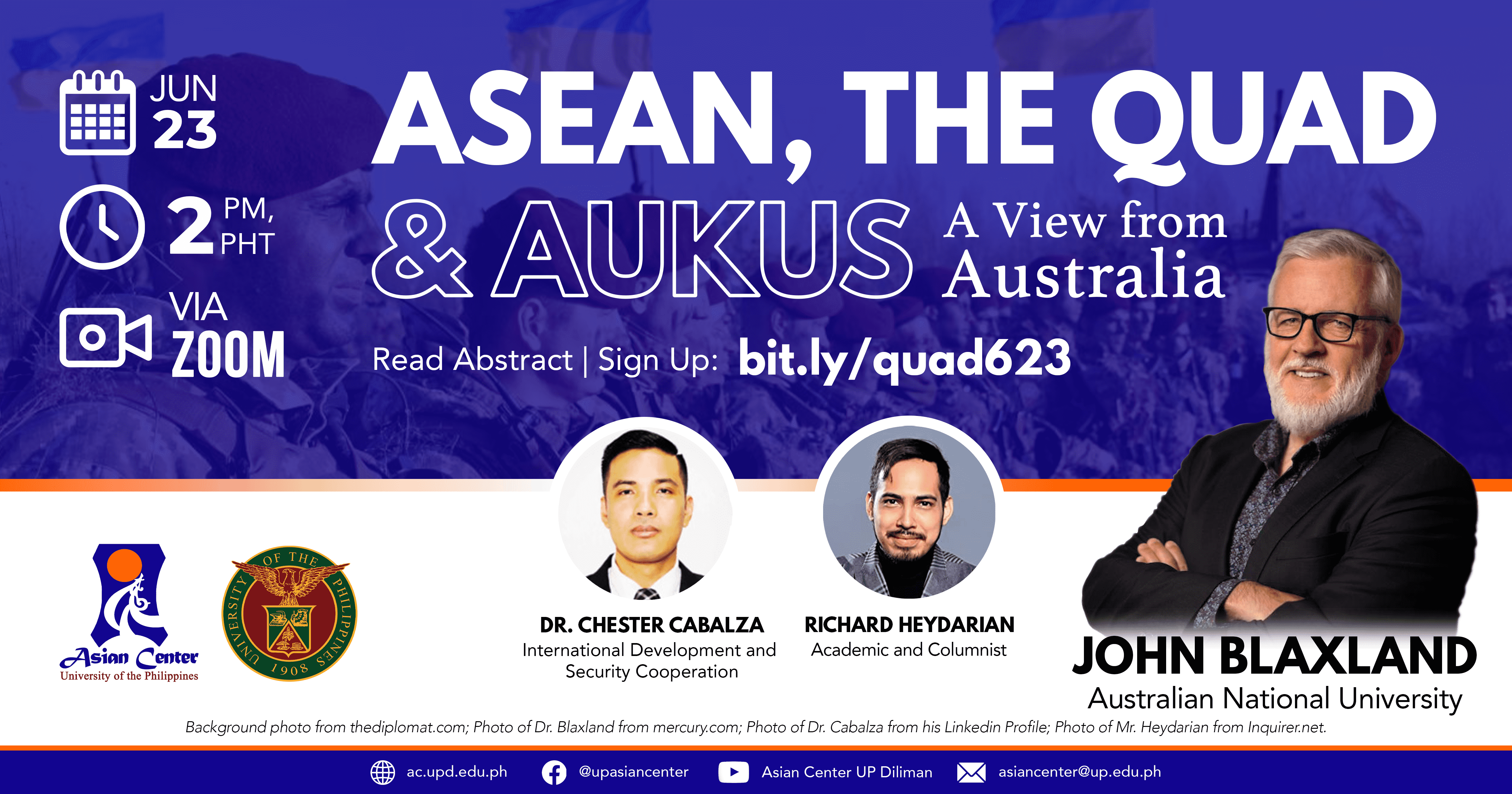
Watch the recording of the webinar, “Decolonizing International Relations: Conversations on Asian (Non-Western) Connections" on 13 August 2021, 2 pm–5 pm, Philippine Standard Time. The webinar is free and open to the public, but participation requires signing in to a basic (free) Zoom account.
The webinar will feature the following presentations:
Re-storying Global Relations
This presentation by Dr. Quỳnh N. Phạm will discuss the need to re-story global relations, with regard to questions on “Non-Western International Relations Theory” and the ongoing politics of decolonization.
Quỳnh N. Phạm is Assistant Professor in the Department of International Studies at the University of San Francisco. Her research focuses on colonialism, forms of violence, feminisms, and politics of decolonization. She is co-editor of Meanings of Bandung: Postcolonial Orders and Decolonial Visions (Rowman & Littlefield International, 2016) with Robbie Shilliam. Some of her other publications include “A Conversation on Art, Epistemic Violence, and Refusal,” coauthored with Linh Tường Đỗ, in International Feminist Journal of Politics (2019); “Decolonial Designs: José Martí, Hồ Chí Minh, and Global Entanglements,” coauthored with María Jóse Méndez, in Alternatives (2015); “Enduring Bonds: Politics and Life Outside Freedom as Autonomy,” Alternatives (2013); and “Colonial Wars, Postcolonial Specters: The Anxiety of Domination,” coauthored with Himadeep Muppidi, in Orientalism and War (Columbia University Press, 2012).
Interrogating and Decolonizing International Relations/International Relations Theory
This presentation provides a historical discussion covering the Celestial kingdom, Bandung/non-alignment/Tricontinental; Mao’s Three Worlds Theory; Socialism with Chinese characteristics; Belt and Road Initiative; and BRICs (and all its variants). It also touches on an essential question raised by Western IR theorists—Is there a non-Western IRT—and inquires, “Can the ongoing new Cold War between frenemies China and US (IR qua IR) suggest the robust emergence of a non-Western and de-colononized IR/IRT?”
Dr. Amado Mendoza, Jr. is a retired Professor of Political Science, College of Social Sciences and Philosophy at the University of the Philippines Diliman.
About the Webinar
The critique of Eurocentrism in international relations theorizing has led to a number of proposals for the review of Western IR Theory and for laying the bases for non-Western counterparts. While Western IRT may still be conceded to be a dominant paradigm in the age of globalization and its discontents, there have been serious scholarship and discourses on the said topic seeking to contribute better understanding of the actually existing relations among nations and other actors.
The proposed webinar is an attempt to familiarize IR students, advocates, enthusiasts and policymakers, among others with the ongoing exchanges on non-Western IRT and to draw insights and lessons where such enterprise may intersect, if at all, with area studies (howsoever conceived) and related themes involving global and regional politics and relations.
Webinar Guidelines
-
When registering for the webinar, use the same email address that you use for your Zoom account.
-
If your registration is successful, you will receive your link to join the webinar. It is the "Click Here to Join." Please do not share your link with anyone else.
-
Attendance is first-come, first-served. The webinar can only accommodate 1000.
-
For a smooth entry to the webinar, log in first to your Zoom account before clicking the invitation/join link.
-
Please type questions only at the Q&A window. You may choose to remain anonymous. Some questions will be read out and answered live. The speaker(s) may wish to respond to the Q&A via chat.
-
The host(s) reserves the right to remove participants who send rude, inappropriate questions or messages.
The UP Asian Center offers M.A. degrees in Asian Studies with four fields of specialization: Northeast Asia, Southeast Asia, South Asia, and West Asia. The Center also has an M.A. program in Philippine Studies that allows students to major in Philippine society and culture, Philippine foreign relations, or Philippine development studies. The Center offers a Ph.D. program in Philippine Studies in conjunction with the College of Arts and Letters and the College of Social Sciences and Philosophy. For an overview of these graduate programs, click here. The Asian Center also publishes Asian Studies: Journal of Critical Perspectives on Asia, the latest issue of which can be downloaded at the journal's website. For other news and upcoming events at the Asian Center, click here.






